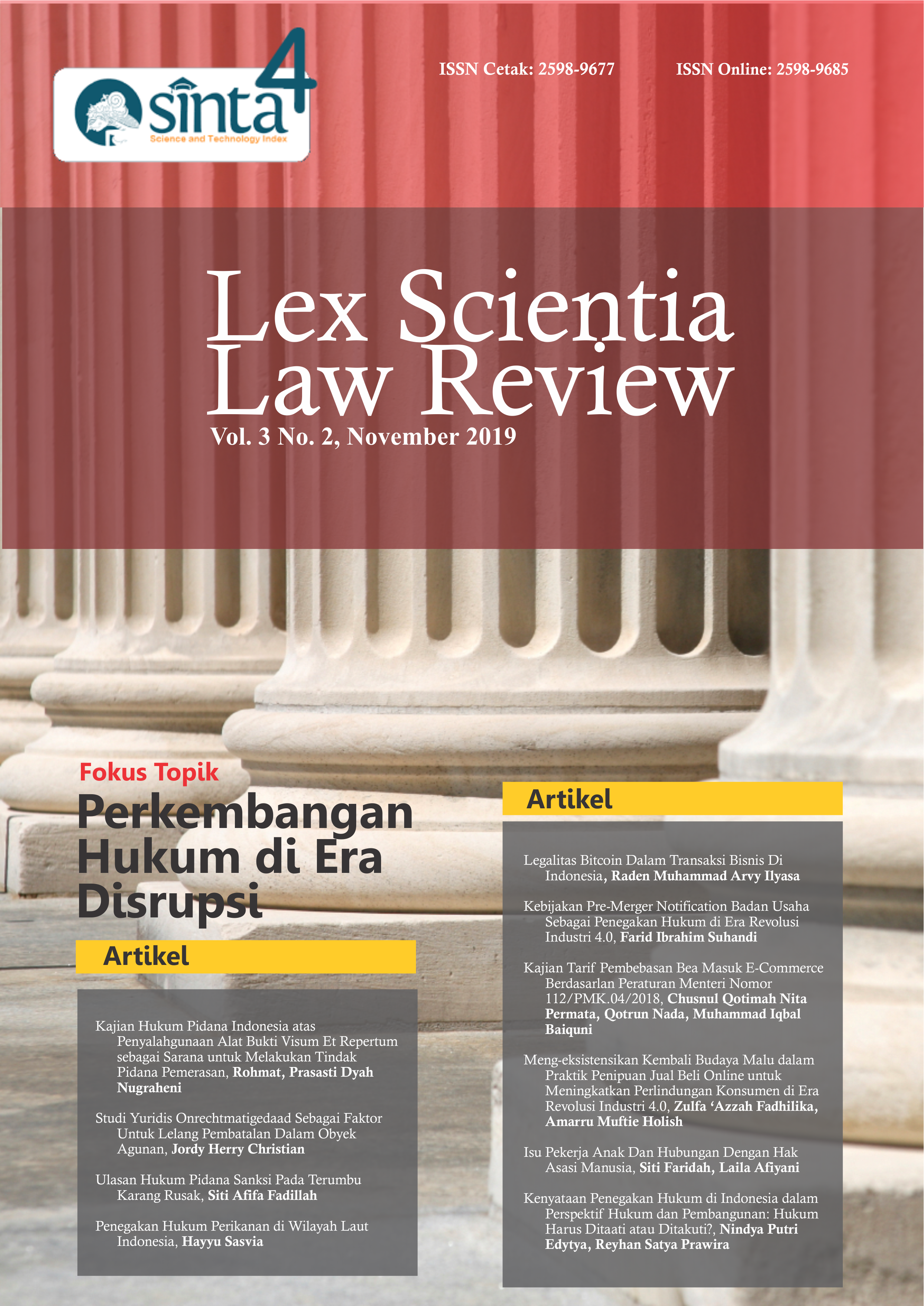Legality of Bitcoin in Business Transactions in Indonesia Legalitas Bitcoin dalam Transaksi Bisnis di Indonesia
Main Article Content
Abstract
The world is currently facing the phenomenon of disruption, where the movement of the industrial world is moving very quickly from the old order to the new order. Developments in the economic field in this era are in line with technological developments, and one of the developments in the economic field is the emergence of Bitcoin. Bitcoin is a virtual money that uses Cryptocurrency technology, as one of the famous virtual money is becoming a new trend as an international payment with all the benefits. Among the existing Cryptocurrencies that stand out the most is Bitcoin. In Indonesia, Bitcoin has attracted attention because of its several advantages and has started to carry out major expansions and has a separate marketplace available. In circulation in Indonesia, Bitcoin has become a polemic in itself in the world and in Indonesia. There are several countries in the world that legalize Bitcoin circulation and have legal regulations and there are also countries that strictly prohibit its circulation. In Indonesia itself there is no clarity whether Bitcoin may be used or not as a currency, as well as the attitude of the government which states that all risks of using Bitcoin are borne by the owner and use of Bitcoin in Indonesia which is contrary to article 28 of the 1945 Constitution which states that the state must guarantee certainty law and legal protection for every citizen.
Article Details
All writings published in this journal are personal views of the authors and do not represent the view of this journal and the author's affiliated institutions. Authors retain the copyrights under this license, see our copyrights notice.
References
Pasal 28 Undang-Undang Dasar 1945
Peraturan Bank Indonesia No.18/40/PBI/2016 terkait dengan system pembayaran
Undang-undang Nomor 11 Tahun 2008 tentang informasi dan transaksi elektronik
Undang-undang Nomor 7 Tahun 2011 tentang mata uang
Eyal Itty & Gun Emin Sirer, ‘’Majority Is Not Enough: Bitcoin Mining Is Vulnerable’’, Department of Computer Science, Cornell University, 2013, hlm.3
Haryono Aby, '' Analysis of the Juridical Bitcoin According to the Regulation Legislation in Indonesia '', Faculty of Law, University of Indonesia '', 2014, hlm.8-9
Rainer, Böhme dkk.2015. “Bitcoin: Economics, Technology, and Governance’’. Jurnal Ekonomi Vol 29, No 2 tahun 2015.32
Sakti Eka Koeswanto & Taufik Muhammad, “Protection of Investors Investing Virtual Currency”, Living Law Journal, 9 (1), 2017
Yohandi Axel, ‘Implikasi Yuridis Penggunaan Mata Uang Virtual itcoin Sebagai Alat Pembayaran Dalam Transaksi Komersial (Studi Komparasi Antara Indonesia-Singapura)’’, Diponegoro Law Journal, 6(2), 2017, hlm.3
Lubis, Muhammad Ikhsan. "Online Buying and Selling Transactions Under International Private Law." Journal of Private and Commercial Law 2, no. 1 (2018): 17-32. https://doi.org/10.15294/jpcl.v2i1.14499
Artikel Online
Anonymous.2018. “BI: Bitcoin Bisa Jadi Alat Pendanaan Terorisme”. https://economy.okezone.com/read/2018/01/24/20/1849544/bi-bitcoin-bisa- jadi-alat-pendanaan-terorisme, (Di akses pada 18 September, 22.23)
Bajpai Prableen , “Countries Where Bitcoin Is Legal & Illegal (DISH, OTSK)” https://www.investopedia.com/articles/forex/041515/countries-where-bitcoin-legal-illegal.asp, (Di akses pada 18 September 2019, 17.09)
Sheet Shobhit, “Is Bitcoin Banned In China”, https://www.investopedia.com/news/bitcoin-banned-china/, (Diakses pada 19 September, 19.20)
